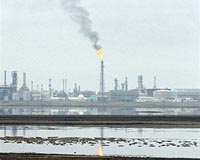 |
Davos, Switzerland (AFP) Jan 28, 2010 The head of Saudi oil giant Aramco on Thursday sought to ease international concerns over dwindling stocks of oil but failed to convince all his customers. Khalid al Falih, Aramco's chairman and chief executive, hit out at "misleading" rhetoric that the world was weaning itself off fossil fuels, saying this did not give producers confidence to keep investing in production. "We feel that the whole issue that came to the surface and created a lot of concern about peak oil is behind us," the head of the world's biggest producer company told a World Economic Forum session on the global energy outlook. He also said that his company was able to maintain a cushion of four million barrels a day of spare capacity even if global demand were to grow. "We don't believe in peak oil," he told reporters later. However, petroleum bosses remained unconvinced. "The problem of peak oil remains," said Thierry Desmarest, chairman of French giant Total. "In our opinion, it will be very difficult to raise oil production worldwide above 95 million barrels a day, which is 10 percent more than today." The problem is not one of insufficient reserves, but that "a lot of it is difficult to be produced." Desmarest told AFP that world oil production could peak in "about 10 years. We are not there yet today." For BP's chief executive officer Tony Hayward, Iraq could be a new oil source, with a potential to boost production by 10 million barrels a day in the next decade. "There is no reason Iraq cannot produce 10 million barrels a day in 10 years," he told the forum. Meanwhile, Al Falih said talk of moving away from fossil fuels -- a major cause of gases that cause global warming -- did not help producers as they seek funds and political backing to keep churning out oil. "Last year, despite the recession, we maintained our investment," the Aramco boss said. "But we don't see the reciprocal assurance (from) policymakers in particular... in terms of giving us the long-term signals that we need to maintain that kind of investment and commitment to long-term supply," he said. "There is too much rhetoric from the public domain about moving away from oil ... that is unachievable, and in many ways misleading to the public." Energy security should be discussed in the framework of the "intertwined relationship between suppliers and consumers," he said, insisting that there would be long term reliance on fossil fuels. While refusing to be drawn on giving an acceptable price range for oil, Al Falih said the world needed to "aim for a price range that will keep us investing, keep consumers able to live their lives... without too much volatility." "The price will be determined by the market, but we need to create enough cushions in the market to ensure that the prices don't escalate like it did," he said. Azerbaijan's President Ilham Aliyev rated the current oil price as "acceptable". Oil is currently trading at about 73 dollars a barrel, half its peak before the global financial crisis hit demand. "Today's level of oil price is I think acceptable for companies, for consumers and for the countries. This level of price allows us to invest more to find more oil and gas," he told the meeting. "The balance ... is at right now," said Aliyev, whose country is a major Central Asian producer of oil and gas. Total's Demarest agreed that the current prices of between 70 to 75 dollars a barrel were "absolutely reasonable." The price "is not too big a charge for economies of consumer countries, and is one that is sufficient to bring new production capacity," he told AFP.
Share This Article With Planet Earth
Related Links Powering The World in the 21st Century at Energy-Daily.com
 Chinese-led group formally signs Iraq oil deal
Chinese-led group formally signs Iraq oil dealBeijing (AFP) Jan 28, 2010 A consortium led by oil giant PetroChina has formally signed a 20-year deal with Iraq to develop the Halfaya oil field, as China boost its presence in the crude-rich region. PetroChina, France's Total, Malaysia's Petronas and Iraq's South Oil will develop the field in southern Iraq, which has proven reserves of about 4.1 billion barrels, the Chinese company said in a statement late Wednesday ... read more |
|
| The content herein, unless otherwise known to be public domain, are Copyright 1995-2009 - SpaceDaily. AFP and UPI Wire Stories are copyright Agence France-Presse and United Press International. ESA Portal Reports are copyright European Space Agency. All NASA sourced material is public domain. Additional copyrights may apply in whole or part to other bona fide parties. Advertising does not imply endorsement,agreement or approval of any opinions, statements or information provided by SpaceDaily on any Web page published or hosted by SpaceDaily. Privacy Statement |